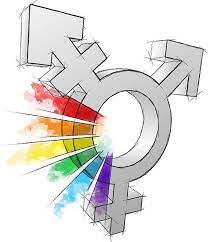In recent years, the conversation surrounding gender identity has gained significant traction, leading to a broader understanding of what it means to be a woman. Among the most inspiring narratives are those of trans women—individuals assigned male at birth who embrace their identity as women. This article seeks to explore their journeys, celebrate their achievements, and highlight the challenges they face in today’s society. By focusing on various aspects of their lives, we hope to shed light on the importance of visibility, representation, and support in the ongoing fight for trans rights and acceptance.
Breaking Barriers: Trans Women Who Inspire Change
Trans women have emerged as powerful advocates for change in a world that often marginalizes their voices. From activism to art, these women challenge societal norms and push for greater acceptance and understanding of gender diversity. Figures like Laverne Cox and Janet Mock have not only achieved success in their respective fields but have also used their platforms to raise awareness about the issues facing the trans community. Their courage to live authentically inspires countless individuals and encourages others to embrace their true selves.Srs Surgery ResultsSymptoms Low Estradiol
Moreover, trans women are increasingly stepping into leadership roles across various sectors, including politics, business, and entertainment. By breaking barriers, they pave the way for future generations, demonstrating that there is no single way to be a woman. Their stories of resilience and determination resonate with many, highlighting the importance of representation and the impact that visibility can have on societal perceptions of gender identity.
Understanding the Journey: Transitioning to Womanhood
The journey of transitioning to womanhood is deeply personal and can take various forms, including social, medical, and legal changes. For many trans women, the transition begins with self-discovery and acceptance, often leading to a desire to express their gender identity more openly. This may involve changes in appearance, name, and pronouns, which can be liberating but also daunting. Each individual’s experience is unique, and the timeline for transition varies widely, emphasizing that there is no “right way” to be a trans woman.
Medical transition may also play a crucial role for some, involving hormone therapy and potentially surgical procedures. These steps can greatly enhance a person’s well-being and help align their physical appearance with their gender identity. However, the journey of transitioning is not solely about physical changes; it also encompasses emotional growth and the ongoing quest for acceptance from oneself and others. Understanding these aspects helps foster empathy and support for trans women as they navigate their paths to womanhood.
Notable Figures: Famous Individuals Who Transitioned
Numerous trans women have made significant contributions to society, capturing the public’s attention and breaking stereotypes along the way. Laverne Cox, known for her role in "Orange Is the New Black," has become a household name and an emblem of trans visibility. Her activism not only highlights issues faced by trans individuals but also educates the broader public about gender identity. Similarly, Jazz Jennings, a prominent reality TV star and LGBTQ+ advocate, has shared her journey from a young age, helping to humanize the experiences of transgender youth.
Another notable figure is Andrea Pegosian, a groundbreaking scientist who defied norms in her field while advocating for trans rights. Her achievements demonstrate that trans women can excel in any discipline, challenging the misconception that gender identity limits one’s potential. These women and many others serve as beacons of hope and inspiration, proving that with courage and determination, trans women can achieve remarkable feats and drive change in society.
Challenges Faced: The Struggles of Trans Women Today
Despite progress in awareness and acceptance, trans women continue to face significant challenges in various aspects of life. Discrimination remains prevalent, with many experiencing bias in employment, healthcare, and social settings. The fear of violence and harassment is an unfortunate reality for many trans women, making safety a constant concern. These systemic issues can lead to higher rates of mental health struggles, homelessness, and poverty among the trans community, underscoring the urgent need for societal change.
Moreover, legal hurdles can complicate the lives of trans women, particularly regarding name changes and gender marker adjustments on identification documents. Navigating legal systems can be daunting and often requires resources that not everyone has access to. As a result, many trans women may encounter barriers to obtaining basic services, further entrenching their marginalization. Addressing these challenges is crucial for fostering an inclusive society where trans women can thrive without fear or discrimination.
Celebrating Diversity: Unique Experiences of Trans Women
Trans women come from a multitude of backgrounds, each bringing their unique experiences and perspectives to the broader narrative of gender identity. Factors such as race, socioeconomic status, and cultural heritage can shape their journeys in distinct ways. For instance, trans women of color often face compounded discrimination, confronting both racial and gender-based biases. Recognizing these intersections is essential for understanding the diverse realities of trans women’s lives and advocating for their rights more effectively.
Moreover, the experiences of trans women can vary based on their geographic location. While some may find support and acceptance in urban areas, others living in rural or conservative regions may struggle to find community and resources. This diversity illustrates that the trans experience is not monolithic; instead, it encompasses a rich tapestry of stories, challenges, and triumphs. Celebrating this diversity is key to building a more inclusive movement that recognizes and uplifts all trans women.
Representation Matters: Media Portrayals of Trans Women
Media representation plays a crucial role in shaping public perceptions of trans women. In recent years, there has been a growing push for more authentic and nuanced portrayals of trans characters in television, film, and literature. Unfortunately, many past representations have relied on stereotypes or misrepresentation, perpetuating harmful misconceptions. However, with the rise of trans actors and creators, the narrative is slowly shifting towards more accurate depictions of trans experiences.
Positive representation not only helps destigmatize trans identities but also provides trans individuals with role models and validation. When trans women see themselves reflected in media, it can foster a sense of belonging and affirmation. Shows like "Pose" and "The L Word: Generation Q" feature trans characters and stories that resonate with both trans and cisgender audiences, promoting empathy and understanding. As more creators take on authentic representations of trans women, the media landscape moves closer to reflecting the diversity and complexity of real-life experiences.
Support Systems: Building Community for Trans Women
Support systems play a vital role in the lives of trans women, providing them with a sense of belonging and understanding. Community organizations, online forums, and local meet-ups offer spaces for trans women to connect with each other, share experiences, and provide mutual support. These networks can be crucial for mental health, as they help combat feelings of isolation and loneliness that may arise from societal rejection or discrimination.
In addition to peer support, many trans women benefit from mentorship programs and resources specifically designed for their needs. Access to healthcare, legal assistance, and educational opportunities can greatly improve their quality of life. Building strong support systems not only empowers trans women but also encourages allies to engage in advocacy efforts, fostering a more inclusive society. By working together, these communities can create safe spaces where trans women can thrive and be their authentic selves.
What’s Next: The Future of Trans Rights and Acceptance
The future of trans rights and acceptance hinges on continued advocacy, education, and awareness. As society progresses towards a more inclusive understanding of gender identity, it is essential for individuals and communities to stand in solidarity with trans women. This includes challenging transphobic attitudes, supporting policy changes that protect trans rights, and amplifying the voices of trans individuals in various spheres of life.
Moreover, fostering allyship is crucial in the fight for trans rights. Allies can play a significant role in advocating for change, whether through activism, education, or simply being a supportive friend. By working together, we can create a future where trans women are celebrated for their identities and contributions, rather than marginalized or silenced. The collective efforts of individuals and organizations will be essential in shaping a world where everyone, regardless of gender identity, has the opportunity to live authentically.
In summary, the journey of trans women is filled with both challenges and triumphs. By understanding their experiences, celebrating their diversity, and advocating for their rights, we can contribute to a more inclusive and accepting society. As we continue to break down barriers and foster supportive communities, let’s remember that every trans woman’s journey is valid and deserving of respect. The movement towards equality is ongoing, and each of us has a role to play in ensuring that trans women can thrive and be celebrated for who they are.


